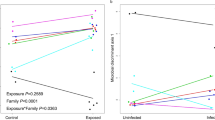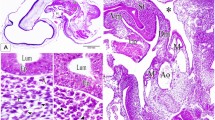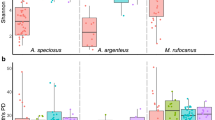Abstract
IT was recently found that some species of the genus Raja could be distinguished solely on differences in the morphology of their spiral valves, in particular, from the form of their mucosæ. A brief account of the latter is given here because, so far as I know, these differences have not been described previously. In addition, it is thought that variations of this kind may explain, in part, the high degree of host specificity found in the Tetraphyllidea, and may have a bearing on specificity in other orders of the Cestoda. A more detailed account of the work will be published elsewhere.
This is a preview of subscription content, access via your institution
Access options
Subscribe to this journal
Receive 51 print issues and online access
$199.00 per year
only $3.90 per issue
Buy this article
- Purchase on Springer Link
- Instant access to full article PDF
Prices may be subject to local taxes which are calculated during checkout
Similar content being viewed by others
References
Parker, J. T., Trans. Zool. Soc., 11, 49 (1879).
Williams, H. H., unpublished Ph.D. thesis (University of Wales. 1957).
Shulman, S. S., Zool. Shurn., 33, 14 (1954).
Llewellyn, J., J. Mar. biol. Assoc., U.K., 35, 113 (1956).
Author information
Authors and Affiliations
Rights and permissions
About this article
Cite this article
WILLIAMS, H. The Intestine in Members of the Genus Rajaand Host-specificity in the Tetraphyllidea. Nature 188, 514–516 (1960). https://doi.org/10.1038/188514b0
Issue Date:
DOI: https://doi.org/10.1038/188514b0
This article is cited by
-
Site selection byMicrophallus pygmaeus Levinsen, 1881 (Trematoda: Microphallidae) in the laboratory mouse
Parasitology Research (1987)
Comments
By submitting a comment you agree to abide by our Terms and Community Guidelines. If you find something abusive or that does not comply with our terms or guidelines please flag it as inappropriate.



